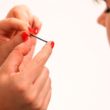Have you felt itchiness down there? If this itch seems bothersome, gynaecologists recommend observing the symptoms carefully before going to the clinic to get accurate diagnosis. When the itch lasts for more than two days and you notice unusual changes or bleeding in the area, then go to your doctor immediately.
Women’s sensitive genital area experiences itchiness that can mean different things. Find out the causes of your itch down there and learn the ways to fix and prevent them.
Here are the reasons why your v-area itches.
1. You have yeast infection.
If you notice yeast down there, you have yeast infection. This is common among three-fourths of women. Symptoms include extreme itchiness, along with an odorless thick, white discharge. Approach your doctor to discuss your symptoms than going for self-medication. Self-medication will make your infection worse.
2. You are experiencing vaginal irritation.
Vaginal irritation are caused by the following: wearing synthetic underwear, using scented panty liners and excessive wearing of it as well as the use of scented soap and feminine wash to clean the area down there.
In order to prevent irritation, do away with habits aforementioned and do the following changes:
• Wear cotton undies to allow your sensitive area to breathe.
• Avoid using scented panty liners and only wear them when the need arises.
• Skip the use of feminine wash or wipes as it affects the pH levels of your vagina, making you more prone to bacterial vaginosis. Your vagina can do self-cleaning. The bacteria in there are good so there is no reason to get rid of them. A clean water and mild soap is enough to clean the outside area of your vajayjay.
3. You are suffering from Trichomoniasis.
It is a common sexually transmitted infection caused by parasite known as Trichomonas vaginalis. According to the US Center for Disease Control and Prevention (CDC), 3.7 million, most of them are women, are infected by this kind of infection but only 30 percent know that they it because it does not cause no symptoms. However, when you have one, it reveals manifestations such as itching, burning, a change in discharge or external white cracking in the skin. As soon as you experience any of these symptoms, consult your doctor right away. Once your tests results show that you are positive of this disease, treatment comes in handy by taking antibiotics. However, you and your partner should undergo the treatment process; otherwise, you will be infected again.
4. You have bacterial vaginosis (BV).
Bacterial vaginosis manifests through a foul-smelling discharge down there. This infection can make your v-area itch. Keep in mind to observe well all the changes you notice in your vagina to get accurate diagnosis. There are times that your Ob-gyn may perceive it as yeast infection since the manifestations are similar.
5. You shave your hair down there.
Shaving your hair down there may look pleasant and feel smooth now. However, once the hair grows back, it becomes too itchy. In a study published in the American Journal of Obstetrics and Gynecology, women who get rid of their pubic hair, 20 percent told that they felt severe itching. If shaving can irritate your vagina, go for vagina-friendly alternative such as trimming the hair or getting a bikini wax.
6. Changes in your hormones can add to the itch.
This is most common cause among post-menopausal women. Their vaginal itch comes along with their changing hormones. When your estrogen hormone drops, this makes the mucosal lining in the vagina thin. To treat this, your doctor will give vaginal estrogen cream or tablet.
7. You have this condition: herpes.
Genital herpes is a sexually transmitted disease caused by herpes simplex virus. Spotting genital herpes is not as easy as seeing a big lesion down there. Symptoms include painful blisters or ulcers in the genital area, itching, painful urination, burning or tingling sensation in the skin. Some experiences fever, body aches and swollen lymph nodes. The symptoms come and go over the person’s lifetime. Unfortunately, there is no identified cure for herpes. The antiviral medications available are given to reduce the severity and frequency of the disease.













